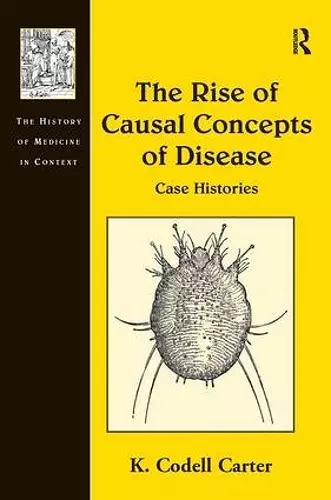The Rise of Causal Concepts of Disease
Case Histories
Format:Hardback
Publisher:Taylor & Francis Ltd
Published:7th Jan '03
Currently unavailable, and unfortunately no date known when it will be back
This hardback is available in another edition too:
- Paperback£56.99(9781138248120)

Much of contemporary medical theory and practice focuses on the identification of specific causes of disease. However, this has not always been the case: until the early nineteenth century physicians thought of diseases in quite different terms. The modern quest for causes of disease can be seen as a single Lakatosian research programme. One can track the rise and elaboration of this programme by a series of case histories. The success of work on bacterial diseases such as cholera and tuberculosis tends to eclipse the broad context in which those studies were embedded. Yet, in the 1830s, fifty years before Koch's publications on tuberculosis, specific causes were already being identified for several non-bacterial diseases including scabies, muscardine and ringworm. Moreover, by the end of the century, the quest for specific causes had spread well beyond bacterial diseases. The expanding research programme included Freud's early work on psychopathology, the discovery of viruses, the discovery of vitamins, and the recognition of genetic disorders such as Down's syndrome. Existing historical discussions of research in these areas, for example, histories of work on the deficiencies diseases, take the view that success in bacteriology was a positive obstacle to the identification of causes for other kinds of diseases. Treating the quest for causes as a single coherent research programme provides a better understanding of the disease concepts that characterise the last 150 years of medical thought.
'The book is extremely well researched. The author has used numerous primary sources, many of them written in German and French. Excellent addition to philosophy, history of science, and medicine collections.' E-Streams 'Occasionally a book comes along from another discipline that illuminates a new path for historical study. The philosopher K Codell Carter's authoritative study of the transition from an assumption that diseases have multiple causes to the modern belief in universal, necessary causes is such a book. For decades, historians have fruitfully explored the social history of modern medicine to the neglect of its intellectual history. Carter's careful dissection of the changing concepts that led to the germ theory of infectious diseases provides a sturdy base on which historians may rectify this imbalance and investigate previously unasked questions about the history of medicine in the last hundred years.' Medical History
ISBN: 9780754606789
Dimensions: unknown
Weight: 476g
248 pages